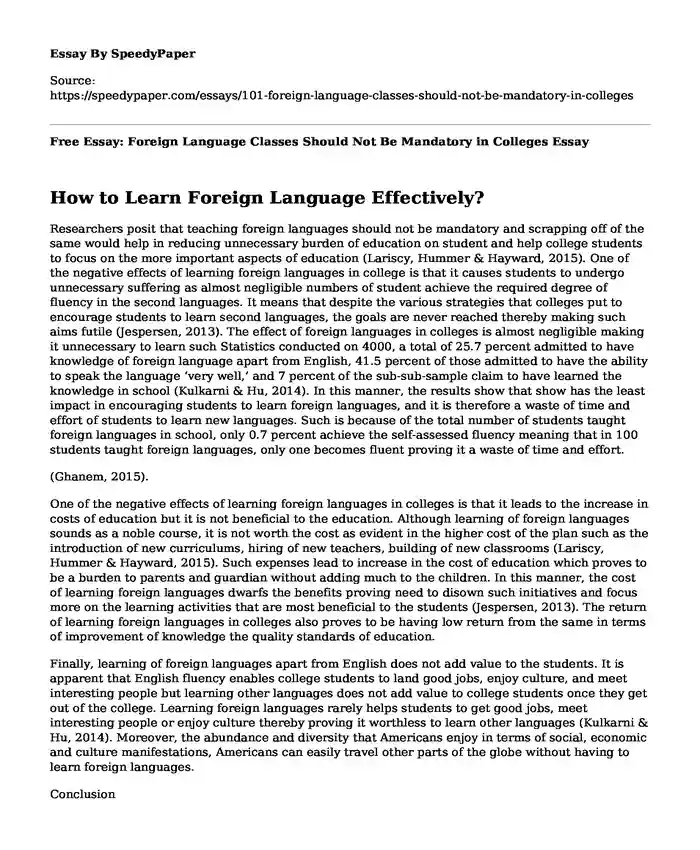How to Learn Foreign Language Effectively?
Researchers posit that teaching foreign languages should not be mandatory and scrapping off of the same would help in reducing unnecessary burden of education on student and help college students to focus on the more important aspects of education (Lariscy, Hummer & Hayward, 2015). One of the negative effects of learning foreign languages in college is that it causes students to undergo unnecessary suffering as almost negligible numbers of student achieve the required degree of fluency in the second languages. It means that despite the various strategies that colleges put to encourage students to learn second languages, the goals are never reached thereby making such aims futile (Jespersen, 2013). The effect of foreign languages in colleges is almost negligible making it unnecessary to learn such Statistics conducted on 4000, a total of 25.7 percent admitted to have knowledge of foreign language apart from English, 41.5 percent of those admitted to have the ability to speak the language ‘very well,’ and 7 percent of the sub-sub-sample claim to have learned the knowledge in school (Kulkarni & Hu, 2014). In this manner, the results show that show has the least impact in encouraging students to learn foreign languages, and it is therefore a waste of time and effort of students to learn new languages. Such is because of the total number of students taught foreign languages in school, only 0.7 percent achieve the self-assessed fluency meaning that in 100 students taught foreign languages, only one becomes fluent proving it a waste of time and effort.
(Ghanem, 2015).
One of the negative effects of learning foreign languages in colleges is that it leads to the increase in costs of education but it is not beneficial to the education. Although learning of foreign languages sounds as a noble course, it is not worth the cost as evident in the higher cost of the plan such as the introduction of new curriculums, hiring of new teachers, building of new classrooms (Lariscy, Hummer & Hayward, 2015). Such expenses lead to increase in the cost of education which proves to be a burden to parents and guardian without adding much to the children. In this manner, the cost of learning foreign languages dwarfs the benefits proving need to disown such initiatives and focus more on the learning activities that are most beneficial to the students (Jespersen, 2013). The return of learning foreign languages in colleges also proves to be having low return from the same in terms of improvement of knowledge the quality standards of education.
Finally, learning of foreign languages apart from English does not add value to the students. It is apparent that English fluency enables college students to land good jobs, enjoy culture, and meet interesting people but learning other languages does not add value to college students once they get out of the college. Learning foreign languages rarely helps students to get good jobs, meet interesting people or enjoy culture thereby proving it worthless to learn other languages (Kulkarni & Hu, 2014). Moreover, the abundance and diversity that Americans enjoy in terms of social, economic and culture manifestations, Americans can easily travel other parts of the globe without having to learn foreign languages.
Conclusion
Statistics and the studies conducted by researchers prove that it is needless for American citizens to learn foreign languages because the aims of such initiatives are never reached, it leads to increase in the cost of education, wastes learning time of students, and does not add value to students once they get out of college. Such proves the need for the society to disown plans of introducing learning of foreign languages in colleges in America.
References
Ghanem, C. (2015). Teaching in the foreign language classroom: How being a native or non-native speaker of German influences culture teaching. Language Teaching Research, 19(2), 169-186.
Jespersen, O. (2013). How to teach a foreign language (Vol. 2). Routledge.
Kulkarni, V. S., & Hu, X. (2014). English language proficiency among the foreign born in the United States, 1980–2007: Duration, age, cohort effects. International Migration Review, 48(3), 762-800.
Lariscy, J. T., Hummer, R. A., & Hayward, M. D. (2015). Hispanic older adult mortality in the United States: New estimates and an assessment of factors shaping the Hispanic paradox. Demography, 52(1), 1-14.
Cite this page
Free Essay: Foreign Language Classes Should Not Be Mandatory in Colleges. (2018, Jun 14). Retrieved from https://speedypaper.net/essays/101-foreign-language-classes-should-not-be-mandatory-in-colleges
Request Removal
If you are the original author of this essay and no longer wish to have it published on the SpeedyPaper website, please click below to request its removal:
- Studies in Second Language Acquisition, Essay Sample for Free
- Free Paper Sample on the Modern Method of Teaching English
- Free Essay Describing a Meeting with the Head of Faculty of Mulberry State University
- Lost in Transition Short Paper Sample
- Paper Example With Annotated Bibliography on Mercy in Immigration
- Essay Sample on Strengths and Weaknesses of Data Collection Methods
- Free Essay Sample: Product Overview of Salubite
Popular categories





